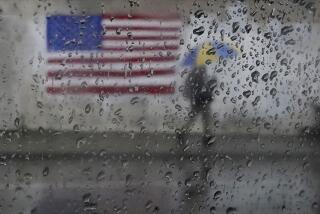Jumpers and Yellers: Moral Fiber Spent
Last month in Seattle, a 26-year-old woman threatened to commit suicide by jumping off a bridge. As a result, a major freeway was closed in both directions for four hours during the morning rush.
According to news reports, many motorists yelled obscenities at the woman, urging her to jump.
This has caused some soul-searching among Seattle residents. But the issue is much more morally complex than simply expressing compassion for the woman and contempt for the shouters.
Certainly, it is difficult for many of us to relate to the mind-set of the shouters. I can only believe that such a mind-set is part of the coarsening of American life. Evidence of this abounds: the routine screaming of coarse and obscene language at sporting events. People who inform the world in vulgarities on the bumper stickers that bad things happen. Television and radio shows that derive their appeal from the degradation of their guests. Popular music. How many of those Seattle yellers do you think had been listening to Bach in their cars?
But to react only with revulsion toward the yellers--as appropriate as such a reaction is--exemplifies another problematic trend in American life: compassion for the individual at the expense of the many.
This woman decided to take her personal grief over a broken romantic relationship into a public place and thereby bring misery to tens of thousands of people. If the yellers represent the coarsening of American life, the woman and those who only express compassion for her represent the widespread narcissism and misplaced compassion that also afflict American life.
It is heartless not to empathize with the pain of rejected lovers, let alone with the pain of those who threaten or commit suicide.
But given that nearly every person suffers romantic rejection, threatening suicide over this loss is the action of a profoundly immature individual. In psychoanalytic terms, such a person has not overcome infantile omnipotence, the belief of the infant that he is the center of the universe.
This woman could have attempted suicide in private or even at that bridge at an hour when few would see her. Instead, she determined that it was important for the world to take notice of her pain. If many thousands of people’s lives were disrupted, too bad. Reacting to her with only sympathy is therefore wrong; she deserves both sympathy and moral condemnation for her self-centeredness and callous attitude toward others.
Yet there is no condemnation of the woman because many Americans have decided that compassion for the individual trumps all other virtues. It does not.
Compassion may be the greatest virtue in one’s personal life, but it must never be the greatest virtue in society’s life. Fairness, for example, must be greater, and expressing compassion only for this woman is noncompassionate and unfair toward the people whose lives she seriously disrupted. Because of her, how many people missed flights to a loved one’s wedding? Because of her, how many people lost out on financial possibilities for which they had worked for years? Due to her self-absorption, how many people in ambulances were deprived of life-saving medical intervention?
If the yellers symbolize a society whose moral fiber has been eroded, the compassion directed at this woman rather than at the many innocent drivers symbolizes a society whose moral fiber has also been eroded by misplaced compassion.
Take the compassion being expressed for Andrea Yates, the Houston woman who is accused of murdering her five children. Women’s groups are raising money for her because she is said to have suffered from postpartum depression and from a malaise that allegedly afflicts mothers who stay at home.
Or take the compassion for AIDS sufferers that has led to the disproportionate funding of AIDS research. Like the woman on the bridge, AIDS activists grabbed society’s attention, much more so than have activists on behalf of diseases that kill far more Americans.
We are right to worry about the yellers. We should worry equally about the many people who feel that they are entitled to unfairly disrupt society because of their pain, and about the many others who defend such unfairness and disruption in the name of compassion.
More to Read
Sign up for Essential California
The most important California stories and recommendations in your inbox every morning.
You may occasionally receive promotional content from the Los Angeles Times.










